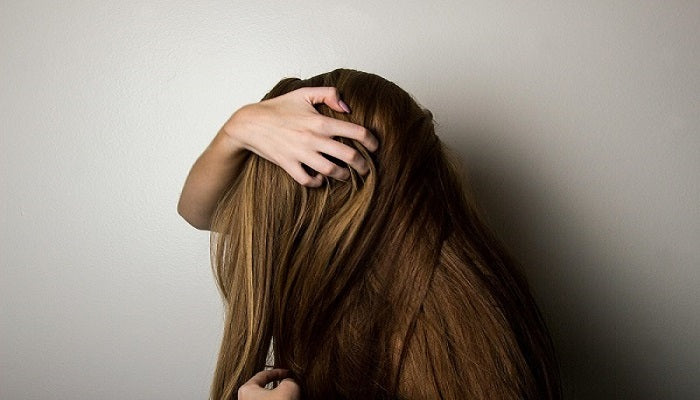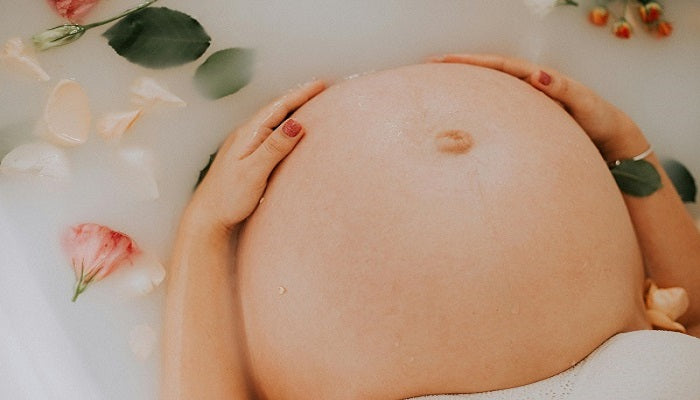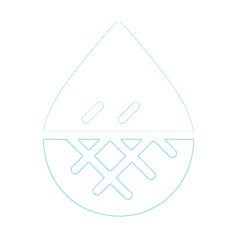Why Your Hair Keeps Getting Worse — It Could Be the Water
Every morning, you step into the shower and try to work up a good lather with your shampoo — but no matter how much you use, it never quite foams the way it should. After drying, your hair feels rough, tangled, and increasingly hard to manage. Split ends keep coming back, and even after switching between multiple “repair” shampoos and hair oils, you’ve seen little to no improvement.
Sound familiar?Many people blame seasonal changes, stress, or simply aging. But the real reason might be much simpler — it could be the water you’re washing your hair with.
In the U.S., over 85% of households have hard water. This type of water contains high levels of minerals like calcium and magnesium. Though invisible, these mineral particles can have a major impact on your hair. They react with shampoos and conditioners, leaving behind residues on your scalp and hair shafts. The result? Dry, dull, tangled hair that’s more prone to breakage and even hair loss.
This isn’t just a theory — it’s something dermatologists and hair care experts are paying close attention to. So how exactly does hard water affect your hair? And more importantly, what can you do to fix it — and prevent further damage? Let’s break it all down and explore real, science-backed solutions to protect and revive your hair.

What is Hard Water? It Might Be Everywhere in Your Home
In the United States, hard water is a common problem—and it starts underground. As groundwater flows through mineral-rich rock layers like limestone and dolomite, it picks up calcium and magnesium ions. These minerals dissolve into the water like tiny passengers, turning otherwise clean, clear water into what we call “hard” water.
This issue is especially common in the Midwest and Southwest regions, where the ground contains high levels of calcium carbonate and magnesium carbonate. Since many areas rely heavily on groundwater sources, hard water is even more widespread. In fact, according to the U.S. Geological Survey (USGS), most water in the U.S. falls into the “hard” or “very hard” category.
Whether you’re using well water or municipal tap water, there’s a good chance it contains high levels of minerals. While hard water is generally safe to drink, it can be a silent culprit behind many household frustrations—like clogged pipes, limescale buildup, reduced cleaning efficiency, and, most annoyingly, dry hair and tight, itchy skin.
Water hardness varies depending on your location and is measured in milligrams per liter (mg/L) of calcium carbonate (CaCO₃), typically falling into the following categories:
|
|
Water Hardness(mg/l CaCO3) |
|
Soft |
Up to 100 |
|
Slightly hard |
100-150 |
|
Moderately hard |
150-200 |
|
Hard |
200-300 |
|
Very hard |
More than 300 |
Aside from minerals, there’s another hidden ingredient in your water that’s worth paying attention to—chlorine. In the U.S., chlorine or chloramine is commonly added to municipal water supplies to kill harmful bacteria, viruses, and other microorganisms. Compared to ozone or UV disinfection, chlorine’s biggest advantage is its longevity—it stays active throughout the entire water system, right up to the moment you turn on your shower.
But while chlorine is great at disinfecting water, it’s far less friendly to your skin and hair. It strips away the skin’s natural oils, leaving it dry, tight, sensitive, and potentially prone to irritation, eczema, or itching. For hair, chlorine lifts the hair cuticle, making strands feel rough, frizzy, and brittle, while also dulling shine and increasing breakage.
And there’s more—during hot showers, chlorine can vaporize, meaning you could unknowingly inhale it while bathing, which may place additional stress on your respiratory system. Surprised? That clear water coming from your tap might not be as harmless as it seems—it could be silently impacting your health and daily comfort.

What Are the Main Damaging Effects of Hard Water on Hair?
You may not realize it, but every time you wash your hair with hard water, your hair and scalp are silently enduring a kind of "chemical stress." The minerals in hard water—though invisible and intangible—accumulate over time with each rinse and can cause multiple types of damage to your hair:
Dryness, Frizz, and Loss of Shine
Minerals like calcium and magnesium cling to the surface of your hair, forming an invisible "mineral coating." This layer blocks moisture and nutrients from penetrating the hair shaft, making it difficult to retain hydration. Over time, your hair becomes dry, rough, and loses its natural softness and shine.
Product Build-up and Residue
If your shampoo doesn’t seem to lather well in your water, it’s not the shampoo’s fault. Hard water interferes with the effectiveness of cleansing agents. As a result, shampoo and minerals mix together and remain on the scalp, clogging hair follicles and leading to buildup, itchiness, and even dandruff.
Increased Breakage, Tangles, and Weakness
The minerals in hard water disrupt the hair’s outer cuticle layer, making strands coarse and more prone to tangling. Hair becomes fragile and breaks easily during brushing or styling, leading to a lack of bounce and a dull, lifeless appearance.
Scalp Irritation and Worsening Hair Loss
While hard water doesn’t directly cause hair loss, it can certainly make it worse by creating a hostile environment for your scalp and hair:
- Disrupts the scalp barrier: Hard water can cause dryness, itchiness, and even inflammation of the scalp. These conditions weaken hair follicles and can push more hairs into the resting (telogen) phase, accelerating hair fall.
- Weakens individual strands: Mineral buildup adds weight and roughness to hair, damaging the cuticle and making strands more prone to snapping—especially when combing or styling. Even if the hair isn’t falling from the root, breakage can still make your hair appear significantly thinner.
- Reduces treatment effectiveness: Mineral deposits may prevent your scalp from absorbing the active ingredients in serums and other haircare products, making your haircare routine less effective and more costly over time.

Signs of Hard Water Damage to Hair
You might wonder—when your hair starts feeling dry or lifeless—is it your shampoo, your styling routine, or could the real culprit be your water? If your home uses hard water, the signs might already be showing, even if you haven’t connected the dots yet.
Common Signs: Your Hair Might Be Sending Distress Signals
-
Hair feels heavy, rough, or hard to detangle after washing
This could be due to mineral residue coating your strands like an invisible “gray film,” blocking moisture from getting in. -
Dryness, frizz, and split ends
Hard water reduces the effectiveness of conditioners and hair masks, making it harder for moisture and nutrients to penetrate your hair shaft. -
Increased hair fall, itchy scalp, or dandruff
Mineral buildup can clog hair follicles, leading to poor scalp health, flakiness, and even worsening hair loss. -
Hair dye fades quickly or doesn’t absorb well
Minerals in hard water can interfere with how dye bonds to the hair, resulting in dull color and faster fading.
These symptoms are often mistaken for using the wrong products, natural hair texture issues, or seasonal changes—but they’re frequently linked to mineral buildup from hard water.
Simple Ways to Tell If You Have Hard Water at Home
- Your soap or shampoo doesn’t lather well and leaves a slippery, filmy feel
- You notice white, chalky stains or rings on faucets, showerheads, or glass surfaces
- Your kettle has a thick layer of scale or buildup inside
These are all typical signs of hard water.For a more accurate assessment, you can buy water hardness test strips—an easy, affordable way to measure your home’s water hardness within minutes. Knowing your water quality is the first step toward protecting your hair (and skin) from unseen damage.

Tackle the Root Cause: Why a Filtered Shower Head Is Essential
Instead of constantly trying to "fix" damaged hair, why not stop the damage at its source? When it comes to hard water-related hair issues, the most effective solution starts in your shower. Installing a high-quality filtered shower head is one of the simplest yet most powerful ways to protect your hair and scalp.
A good filteration shower head is equipped with a multi-stage filtration system that purifies water through a combination of filter media. Common filtration materials include:
- KDF-55: Effectively removes chlorine, heavy metals (like lead and mercury), and inhibits bacterial growth.
- Calcium Sulfite: Quickly neutralizes free chlorine in hot water, reducing irritation to the scalp.
These filtration layers work together to reduce mineral buildup, soften water, and minimize chlorine’s harsh effects—resulting in gentler, skin-friendly water. With softened, purified water, your scalp feels more comfortable, your hair absorbs products better, and your overall hair care routine becomes far more effective. Many users notice smoother strands, reduced hair fall, and less post-shower frizz within just a few weeks of switching.
Worried about water pressure? Don’t be. High-quality filter shower heads are engineered to maintain strong, consistent water flow. Take the AquaNurture filtered shower head, for example: despite its multi-stage filtration, it delivers excellent water pressure and a satisfying shower experience.

Recommended Solution: AquaNurture Filtered Shower Head
If you're searching for a reliable way to combat hard water damage, the AquaNurture filtered shower head might be just what you need. Designed with advanced multi-layer filtration, it effectively removes chlorine, heavy metals, and mineral impurities—while keeping water soft and gentle on your skin. It’s easy to install, compatible with most standard showers, and starts protecting your hair from the very first drop.
Daily Hair Care Tips to Pair with a Filtered Shower Head
Even with a filteration shower head, maintaining healthy hair requires good daily care habits. Hair that has been exposed to hard water is like skin damaged by pollution—it needs extra gentle care to recover. Here are a few simple yet effective tips to help restore and protect your hair:
Use gentle, sulfate-free hair care products
Avoid shampoos containing sulfates, alcohol, or harsh chemicals. These ingredients can further irritate the scalp and dry out your hair, especially when combined with hard water. Look for sulfate-free formulas or products enriched with nourishing ingredients like coconut oil, glycerin, or aloe vera.
Pat your hair dry with a soft towel
Avoid rubbing your wet hair with a rough towel, which can damage the cuticle and lead to breakage. Instead, use a microfiber towel and gently press or pat your hair to absorb excess moisture.
Hydrate from within: drink more water and eat a balanced diet
Your hair’s health also depends on your overall wellness. Drink plenty of water daily and eat foods rich in protein, iron, zinc, B vitamins, and omega-3 fatty acids—like eggs, leafy greens, nuts, and fatty fish—to support healthy hair growth and repair from the inside out.
Replace your shower filter regularly
Even the best shower filters need maintenance. Most filter cartridges should be replaced every 3–6 months depending on your water quality and usage. An expired filter not only loses effectiveness but may even harbor bacteria. Check your product’s guidelines and replace the cartridge on schedule to ensure clean, hair-friendly water every time you shower.
Conclusion: Don’t Let Hard Water Ruin Your Hair — Start Changing from Today
If you’ve been struggling with dry, frizzy, brittle hair, color that won’t hold, or excessive hair fall — the culprit might not be your shampoo or conditioner. It could be your shower water.
Daily exposure to hard water can lead to long-term damage to your scalp and hair structure. And switching hair care products without addressing the real source is like patching a cracked wall without fixing the foundation — it’s temporary, not transformational. True hair care begins at the root — and that means starting with better water.
Upgrading to a filtered shower head isn’t just a beauty choice — it’s a lifestyle upgrade. By removing excess minerals, chlorine, and heavy metals, a high-quality shower filter transforms your everyday water into something gentler and safer for your hair and skin.
Don’t let hard water silently sabotage your hair any longer.Choose a powerful, reliable filter head shower — like AquaNurture — and give your hair the clean, healthy start it deserves from the very first drop.
Click the link below to get your personalized hard water hair care solution today.Let the transformation begin — your hair will thank you.

Frequently Asked Questions About How Hard Water Affects Hair Health
Q1. What is hard water and why is it harmful to hair?
Hard water contains high levels of minerals like calcium and magnesium. These minerals can build up on your scalp and hair, leading to dryness, frizz, dullness, and even scalp irritation.
Q2. What are the signs that my hair is damaged by hard water?
Common signs include dry and lifeless hair, heaviness after washing, tangles, breakage, increased dandruff, itchy scalp, and color treatments fading quickly.
Q3. Can a filtered shower head really help with hard water hair damage?
Yes. A high-quality filtered shower head for hard water can effectively reduce minerals, chlorine, and heavy metals in your water—helping to minimize scalp irritation and buildup, and restore hair’s natural shine and softness.
Q4. How often should I replace the shower filter cartridge?
It’s recommended to replace the filter cartridge every 3 to 6 months, depending on your water quality and usage. Regular replacement ensures optimal filtration and prevents secondary contamination.
Q5. What else can I do to protect my hair from hard water damage?
In addition to using a shower filter, choose a sulfate-free shampoo, deep-cleanse and hydrate regularly, avoid excessive heat styling, and maintain a balanced diet with plenty of hydration.
Q6. Can hard water cause hair loss?
While hard water doesn’t directly cause hair loss, it can contribute to clogged follicles, scalp inflammation, and overall weaker hair—potentially increasing hair shedding in people already prone to hair loss.








Leave a comment
This site is protected by hCaptcha and the hCaptcha Privacy Policy and Terms of Service apply.